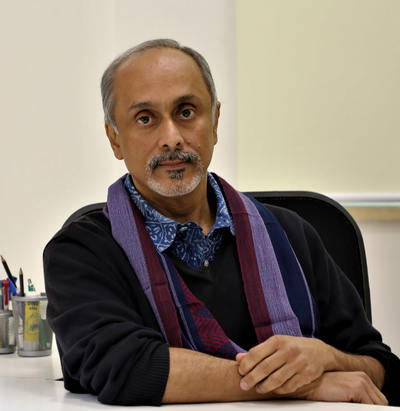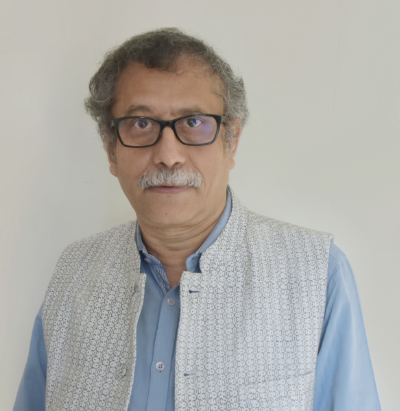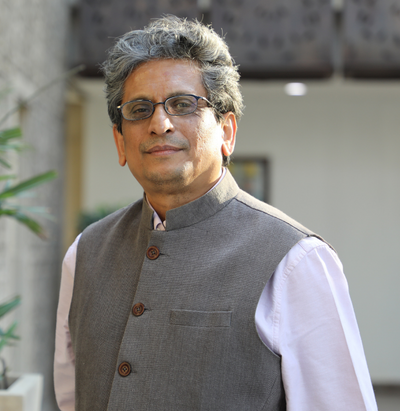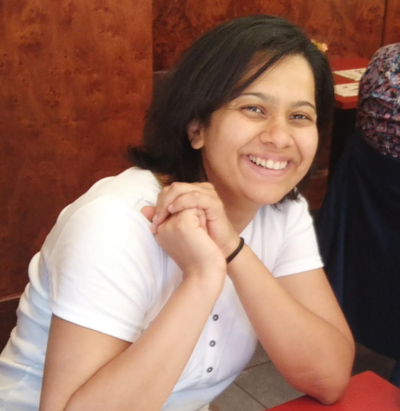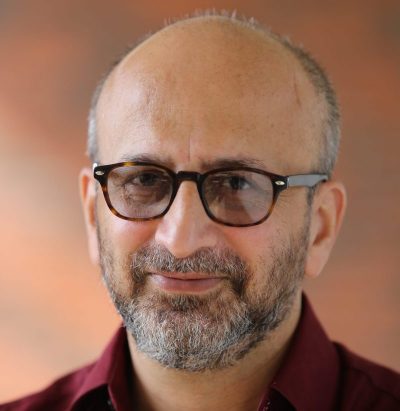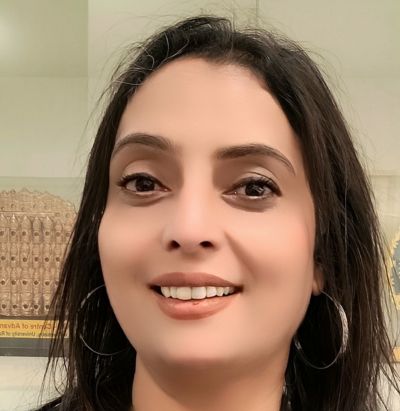Science provides an unparalleled view of the order and symmetry of the universe and its workings from subatomic particles to the infinity of space. Principles of Science looks at the evolution of scientific thought over time and at the landmark moments of discovery. It also helps students understand the essence of the scientific temper which is characterized by unbiased observation and multiple methods of validation and falsification. With the many fields of science within its purview, mathematics emerges as the unifying link.
Department: Physics | Semester: Monsoon 2023
This course will provide a survey of the evolution of scientific understanding, expanding from specific examples that I’ll use to illustrate general principles. What’s special about it is that I’ll use climate change as my anchor point: What we know about human-induced climate change and how we know it, the importance of understanding climate change implications for food security, health, and large-scale migrations, the effects of climate change on ecological processes, and the nature of the mathematics that allows us to think about all this. I’ll branch out from this to explain the nature of evidence itself and how scientists interpret it. Examples I’ll use may include:
(i) The British doctors’ cohort (how we know smoking is bad for you, illustrating evidence in epidemiology and the importance of randomized control trials)
(ii) the evolution of the atomic theory (how can we reason about things we can’t see?)
(iii) the evolution of the periodic table (why is the whole world made up of a limited set of building blocks?)
(iv) nuclear energy and atomic bombs (experiments that point the way to a deeper understanding of fundamental constituents of nature and the ethical and moral consequences of such knowledge)
(v) evolution (are there “laws” in biology and what determines the diversity we see around us?)
(vi) DNA and genetic engineering (Watson, Crick and Franklin and the Nobel prize, ethical issues around cloning).
The course will introduce some mathematical concepts along the way that relate to these examples, among them: counting arguments, probability, random walks, functions, and simple statistics, so that the role of mathematics in helping us think is illustrated. The course assumes no prerequisites, except for a willingness to learn new things and to also view material you may have encountered in school with a new eye.
Department: Chemistry | Semester: Monsoon 2023
The course deals with the effect of length scales on phenomena that we see around us. It will introduce the concepts of length scales and their effects from examples out of our experience and analyze the broad basis at a pedagogical level. Understanding from electronic to atomic and molecular scale to coarse graining in biological systems has enriched the multi-scale effects in science. The large length limit of classical mechanics has been one that forms a well understood part of science. The discovery of quantum mechanics about a hundred years back has been one of the most disruptive ones and is established as one which allows us to understand the small length science. The metaphysics behind quantum mechanics will be explained. The course will also deal with intermediate length scales, going up from smaller length scales progressively upwards to mesoscopic length, which has been of great recent interest that has enriched science, from quantum systems to Nanotechnology to system level biology. It will be taught at a level which will be of interest to those not only interested in science, but also humanities.
Department: Biology and Physics | Semester: Monsoon 2023
Science entails the systematic pursuit of knowledge, which essentially involves unbiased observations and multiple methods of validation. Science gives us the ability to understand how our world works and how we interact with our physical surroundings. It not only incorporates basic ideas and theories about how our universe behaves but it also provides a framework for learning more and tackling new questions and concerns that come our way. Science also provides an unparalleled view of the order and symmetry of the universe and its workings—subatomic particles to the never-ending space. Science enables you to integrate with your surroundings, both living and non-living. It has also given us the tools to alter living and non-living things. It has the potential to have both positive impacts such as coping with natural disasters, curing diseases, and discovering new sources of energy, as well as negative impacts in the form of climate change and weapons of mass destruction.
The course narrates some of the key theoretical and technical developments in the evolution of the sciences and offers a synoptic view of the development of concepts that drive modern science.
Department: Physics | Semester: Monsoon 2023
This course discusses how we evolved the concept of age and time- age of the earth and of the solar system, time in relativity (and arrow of time, entropy), time in biological systems (biological clocks) etc. Through this course we would be like to bring to the students, our current understanding about the scale and age of the Universe, and how this knowledge has evolved; How biological systems including human body maintain temporal patterns; impact of climate change and ecological damage on biological time and the evolution of survival strategies that require understanding of past, present and future.
The course will start with a general introduction and historical perspective to the concept of time in our day-to-day life and in physics and in biology. We shall discuss the history of measurement of time and invention of clocks. Without involving much mathematics, the course will help students derive relationship between speed of light and time, space-time continuum, age of the universe, stars, earth etc. We would then follow concept of time in biology in the context of birth-growth-ageing-death. Seasonal variations in morphological and life-history traits as measurement of time, mechanism of timekeeping – biological clocks, circadian rhythms. We will also discuss the evolutionary time and the important concepts pertaining to our understanding of this such as generation time of different living beings. The course ends with discussions on human cognition and the concept of time: conceptual understanding of past, present and future.
The course is taught through lectures, discussions, flip-the-classroom mode (students making presentations on various related topics), reading books/watching movies and writing assignments.
Department: Physics | Semester: Spring 2024
The Physical Universe
In this foundation course, we will try to understand how science works in the context of the physical universe as a whole, i.e. in the domain of astronomy and cosmology. To do this we will focus on four scientific questions, and how scientists go about answering them. These questions are:
Are there planets outside the solar system?
What is the nature of space and time in deep space?
What is the nature of space and time near massive objects?
Did the physical universe have a beginning and will it have an end?
In the first section, we will figure out, among other things, how Newton’s theory of gravity can be used to reveal invisible objects.
In the second we will learn Einstein’s special theory of relativity, which is a theory about space and time with extraordinary consequences like length contraction and time dilation.
In the third we will explore how Einstein modified Newton’s theory of gravity, explaining that it was not a force but a modulation of the fabric of space-time masquerading as a force. The consequences are dramatic near exotic objects like black holes, and we will try to understand what they are.
In the final section, we will see how all of this underlies our understanding of the physical universe as a whole and try to see if we can find answers to some fundamental questions about it. We will finish with some tantalizing unsolved problems.
In the process of answering our four questions, we will discover, hopefully, how science works.
The course is being designed for non-science majors, but I will expect students to be willing to learn how simple mathematical formulas and graphs work and to do some basic calculations.
Watch Video
Department: Chemistry | Semester: Monsoon 2023
The perspective of Chemistry: From philosophy to technology
A scientific viewpoint to understand the world started from Democritus (c. 460-c.370 BC), a Greek pre-Socratic philosopher who first coined the term atom and atomic theory Plato was an Athenian philosopher and founder of the academy, Platonist School of Thought, the first institution of higher learning in the western world. Platonism proclaims the existence of abstract objects associated with the physical world meaning, sets, numbers, etc. Aristotle a student of Plato’s Academy in Athens (c. 347 BC) contributed to science enormously. Philosophical issues related to scientific discovery are closely related to philosophical ideology and perception that arise through observation and curiosity. During the modern era of scientific discoveries Antoine Lavoisier (A father of Modern Chemistry), John Dalton, Michael Faraday, Dmitri Mendeleev, etc. developed scientific theories, and based on those theories, today’s technological discoveries are happening at a great pace. The inspiring stories of seminal discoveries and understanding of scientific concepts are necessary to develop the right scientific temperament and to change our problem-solving approach.
This course covers the following important topic which is necessary in developing a strong foundation to study chemistry because chemistry is everywhere and in everything!
The course comprises the following topics:
- Background: A viewpoint of philosophers and alchemists, chemistry in ancient art, and the development of modern chemistry
- Basic organic chemistry: Interesting chemical reactions transformed the world, chemical reactivity, and understanding of the logic of bond breaking and bond formation in organic reactions
- Chemistry in nature: Medicinally important small organic molecules, chemistry in the well-being of the mind, the chemistry of colors and fragrances, etc
- Periodic table: Discovery, development, and arrangement of elements
- Electrochemistry: Redox reactions and their applications
- Chemistry for sustainability: Current global issues and possible approaches to address these issues





